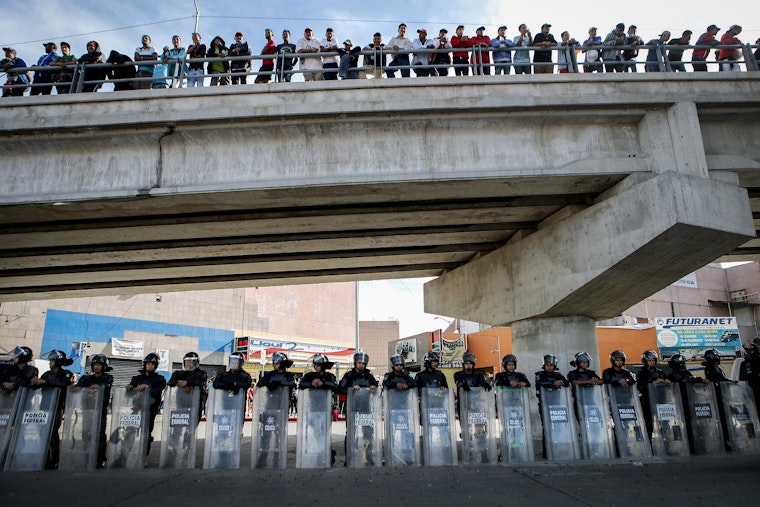How Independent Agencies Can Begin to Hold Police Accountable
By Masha Lisitsyna & Ian Scott

Recent events—ranging from the murder of George Floyd and other killings of Black people at the hands of U.S. police officers to the systemic torture of protesters by police in Belarus, to the deaths of people detained during COVID-19 lockdowns in India and Kenya—shine a bright light on global patterns of violence committed by the police.
Currently, investigations of excessive use of force and police violence are most often taken up by police themselves. Too often, when police investigate their own, they fail to pierce the “blue code of silence.” An appeal court in Kenya found that the “blue code of silence” is a common phenomenon worldwide, spanning police cultures in America, Europe, Asia, and Africa. Under this unwritten rule, police officers never provide incriminating information about their colleagues and often cover up knowledge of a fellow officer’s wrongdoing with a collective blanket of self-preservation.
While it remains the norm in many countries, police should not investigate fellow police, especially when they potentially committed serious crimes. Effective, independent criminal investigations are critical to holding the police and other state agents accountable for serious crimes. They also help in building public trust in police.
Our new publication, Who Polices the Police? The Role of Independent Agencies in Criminal Investigations of State Agents, explores examples of how different countries in Africa, the Caribbean, South and North America, and Eastern and Western Europe are building agencies separate from the police to conduct and prosecute allegations of serious crimes by police or other state agents.
Independent agencies should be the lead investigators whenever a person dies or is seriously injured in detention or in other contact with state agents. They also should investigate any allegations of torture, including psychological, sexual assault, or enforced disappearance.
Based on more than two dozen interviews, a review of relevant literature, and the practice of fifteen independent agencies and prosecutorial departments, our publication provides recommendations for improving independence, increasing investigative and prosecutorial power, and ensuring transparency among these agencies.
Independence
Independence is the oxygen of a credible investigative agency. Yet, independence from the police or political establishments is not easily secured. Even after it is won, it can be impinged upon in many ways. To be effective, the agencies need separate legislation, an appropriate dedicated budget, and a separate physical facility. The agency’s director should not be a former state agent and must be assured of independence from external pressures, particularly in how that leader is appointed and potentially dismissed.
For example, we found that in South Africa, the Constitutional Court ruled that the head of police cannot suspend or remove the executive director of an oversight agency. Last year, the South African National Assembly passed legislation that the only authority that can remove the executive director is the South African Parliament, with a two-thirds majority vote.
Powers
Investigators must have the same powers as police officers within their jurisdiction and should be able to investigate police and other state agents, including superiors and military, at least when performing police functions.
For example, we found that in Argentina in 2019, the Federal Criminal Court sentenced the director of a prison unit to six years and six months in prison for the crime of failing to prevent the application of torture, alongside harsher sentences for the other 14 prison officers involved. In addition, a regional inspector of the penitentiary service was convicted and sentenced to six years in prison for failing to report the crime.
Independent agencies should conduct the initial investigative actions, such as crime scene examinations, and have trained staff and appropriate resources. For example, INDECOM, the independent agency in Jamaica, attends all crime scenes involving any state agents, including police, army (if acting jointly with the police), or correctional officers. The INDECOM Act authorizes it to take charge of and preserve the scene of any incident.
Transparency
It is important that independent investigative agencies communicate to the victim, agents, and the public on their decision to charge or not charge a state agent. When the decisions to charge lie exclusively with prosecutors, there should be strict protocols of informing the director and allowing them to issue public statements. In Ontario, the Director of the Special Investigations Unit is personally responsible for each decision to charge a state agent. In case of the decision not to charge, the director issues a public notice explaining the grounds for their decision.
In the end, criminal investigations alone will not stop the abuse by police and other state agents. Police departments also need internal controls of use of force, strong disciplinary procedures, culture change in police and security forces. Prosecutors as well as investigators need to be specialized. Civil society plays a key role in identifying cases of abuse, supporting victims, and providing medical and other evidence.
Even well-functioning agencies are imperfect and are not a panacea for police violence. Nonetheless, our report shows that independent investigative agencies, if established properly, can contribute to police accountability, effective investigations into state agents’ actions with respect of fair trial rights, all of which lead to greater justice for victims.

Masha Lisitsyna is a senior managing legal officer with the Accountability division at the Open Society Justice Initiative.
Ian Scott is a former director of the Special Investigations Unit in Ontario, Canada.